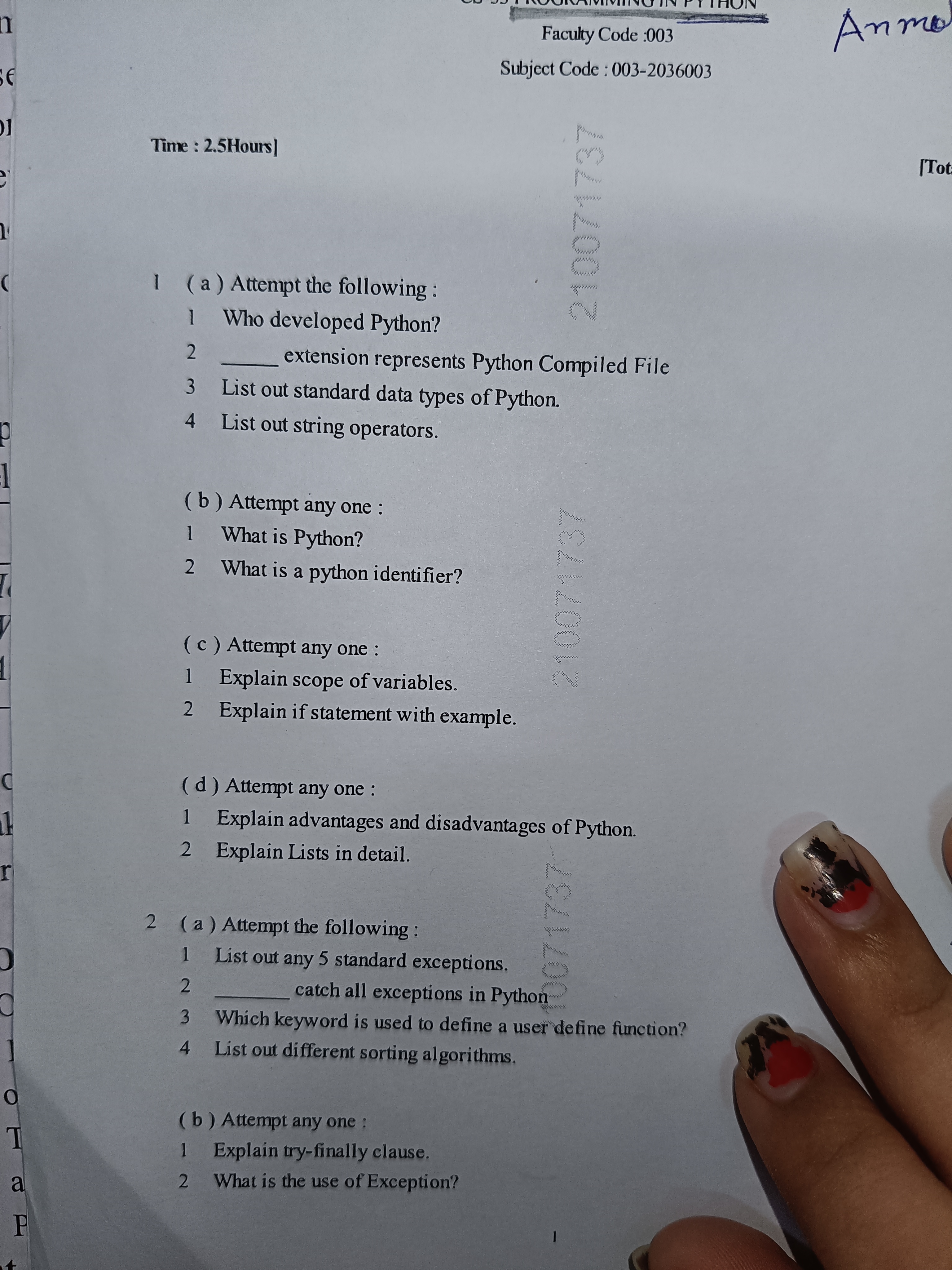Who developed Python? ___ extension represents Python Compiled File. List out standard data types of Python. List out string operators. What is Python? What is a python identifier?... Who developed Python? ___ extension represents Python Compiled File. List out standard data types of Python. List out string operators. What is Python? What is a python identifier? Explain scope of variables. Explain if statement with example. Explain advantages and disadvantages of Python. Explain Lists in detail. List out any 5 standard exceptions. ___ catch all exceptions in Python. Which keyword is used to define a user define function? List out different sorting algorithms. Explain try-finally clause. What is the use of Exception?

Understand the Problem
The document appears to be a set of examination questions related to the Python programming language, including topics such as the developer of Python, its data types and operators, exceptions, and error handling.
Answer
Guido van Rossum developed Python. '.pyc' is used for Python compiled files. Data types: int, float, string, list, etc. Use 'def' for functions. 'Exception' catches all exceptions.
- Guido van Rossum developed Python. The '.pyc' extension represents a Python compiled file. Standard data types in Python include integer, float, string, list, tuple, dictionary, boolean, and set. String operators include concatenation (+), repetition (*), slicing ([::]), etc.
- (b) Python is a high-level, general-purpose programming language focused on code readability. A Python identifier is a name given to entities like variables and functions.
- Variable scope refers to the region where a variable is accessible. An 'if' statement executes code if a condition is true, e.g.,
if x > 0: print('Positive'). - Python advantages: easy syntax, large community. Disadvantages: slower execution. Lists are ordered collections, mutable, and allow duplicates, e.g.,
[1, 2, 3]. Common exceptions:ValueError,TypeError,IndexError,KeyError,ZeroDivisionError. - 'Exception' can catch all exceptions. Use 'def' to define user functions. Sorting algorithms: quicksort, mergesort, bubblesort, insertionsort, selectionsort. A 'try-finally' clause ensures finalization code runs regardless of exceptions. Exceptions manage errors gracefully, allowing for debugging and controlled exits.
Answer for screen readers
- Guido van Rossum developed Python. The '.pyc' extension represents a Python compiled file. Standard data types in Python include integer, float, string, list, tuple, dictionary, boolean, and set. String operators include concatenation (+), repetition (*), slicing ([::]), etc.
- (b) Python is a high-level, general-purpose programming language focused on code readability. A Python identifier is a name given to entities like variables and functions.
- Variable scope refers to the region where a variable is accessible. An 'if' statement executes code if a condition is true, e.g.,
if x > 0: print('Positive'). - Python advantages: easy syntax, large community. Disadvantages: slower execution. Lists are ordered collections, mutable, and allow duplicates, e.g.,
[1, 2, 3]. Common exceptions:ValueError,TypeError,IndexError,KeyError,ZeroDivisionError. - 'Exception' can catch all exceptions. Use 'def' to define user functions. Sorting algorithms: quicksort, mergesort, bubblesort, insertionsort, selectionsort. A 'try-finally' clause ensures finalization code runs regardless of exceptions. Exceptions manage errors gracefully, allowing for debugging and controlled exits.
More Information
Python is popular for its simplicity and readability, making it a favorite for beginners and experts alike. Its standard library supports a wide range of functionalities, from web development to data analysis.
Tips
Remember to use parentheses correctly with string operators and ensure proper indentation with control statements in Python.
Sources
- Introduction To Python - GeeksforGeeks - geeksforgeeks.org
- Python Data Types - GeeksforGeeks - geeksforgeeks.org
- Python Data Types (With Examples) - Programiz - programiz.com
AI-generated content may contain errors. Please verify critical information